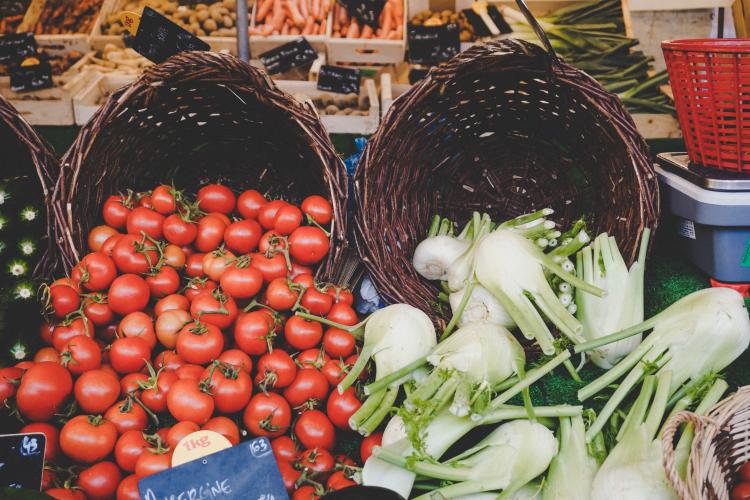Making sustainable food accessible to all

- By Desré Kramer
What needs to change to make sustainably-grown food accessible to low-income Canadians? Food Secure Canada has embarked on research to guide future policy-making.
Major government-level changes will be needed to ensure access to sustainably-grown food for people living on low incomes. This is the overarching finding of the first phase of a study that is being conducted by Food Secure Canada (FSC), funded by Innovation, Science and Economic Development Canada. The research will identify and prioritize policies on food security that could improve the accessibility of sustainability-grown food across the country.
The “Sustainable Consumption for All” research project is investigating the problems low-income people have with accessing and buying sustainably-grown food. The initial, and still preliminary, findings are based on interviews with 24 people, and on the input from two kitchen-table focus groups. The next steps include three more focus groups and a survey of 1,500 people, which will include people from all regions.
Definitions
For the purpose of the study, sustainably-grown food is defined as locally-grown food that does not use pesticides or GMO seeds, uses fair labour practices for farm workers, treats farm animals humanely, and uses farm practices that encourage biodiversity.
Initial findings about barriers
Some of the findings from the initial phase are:
- Consumers, if given the choice, would prefer to buy and eat sustainably-grown fresh fruit and vegetables;
- However, many people on low income do not necessarily trust that the premium price they pay for sustainably-grown food is actually giving them a better product;
- Organic and agro-ecology farmers sell their produce at premium prices because they are usually small-scale, without savings from economies-of-scale;
- People living on low income in cities use most of their money to meet high housing costs. They can only buy food that is cheap, which is usually imported produce, grown using pesticides and GMO seeds;
- It is very difficult for people of low income to advocate for changes such as a guaranteed annual income, increases in social assistance, or increases in the minimum wage, so it is essential that those with expertise and experience in advocacy take on this vital role.
Where are these initial findings coming from?
The people who were interviewed in this first phase are experts in the field. They came from Quebec, northern and southern Ontario, British Columbia and Nova Scotia. They are advocates and activists in the field of food insecurity, poverty, sustainable agriculture, agroecology, food sovereignty, community engagement, and democratic engagement. They shared their ideas on how the food system could be changed so sustainably-grown food could be accessible for all.
The initial kitchen-table discussions were in Toronto and Sudbury. Three more will take place in Montreal, Vancouver and Thunder Bay (and Halifax may be added). The focus group participants have self-identified as low-income with an interest in discussing issues about food. The discussions are facilitated by local community organizers.
The online survey will be conducted at the end of the year (2018), supported by Environics. The survey will ask about buying and accessing sustainably-grown food and if this is important for consumers.
A guaranteed annual income, and other policy ideas
All those interviewed and the focus group participants, have agreed that everyone should have a guaranteed annual income. Other ideas proposed include:
- Subsidize five basic foods so they are available for $1/pound (for example, potatoes, onions, carrots, broccoli and beans);
- Provide tokens for low-income consumers to shop at farmers’ markets;
- Provide subsidies to organic and eco-ecology farmers for their contribution to the environment;
- Have more distribution hubs for organic farmers;
- Institute subsidized, universal food programs in schools; and
- The government should focus less on the export of food and more on encouraging local, sustainable food production.
The study team is collaborating with a Research Advisory group with representatives from sustainable food businesses and farmers, academics, community food organizations with a focus on low-income consumers, and environmental consumer organizations. The principal researcher (Dr. Desré Kramer) and the project manager (Dr. Rhonda Ferguson) are consulting with them during the study.
- Log in to post comments


Comments
Sustainable healthy food for low income folk
I'm so glad to see this being addressed! This has been a tension in the food movement as long as I can remember. My doctoral field research (conducted in 2016) included over 20 semi-structured interivews with people living on low-incomes in Kingston, ON and many of them spoke at length (unprompted) about the impossibility of eating local, sustainably produced food on their budget, despite their desire to do so for both health and enrvironmental reasons. Several parents, in particular, were very concerned that they couldn't afford to feed their children the food they wanted to be feeding them. If there is any way to include Kingston in this research, I am sure I could help to convene a thoughtful group of folks who would love to talk about this. Contact me at susan.belyea@queensu.ca.
Kevin
Wow brilliant information post it is very interesting content post such an useful for me i really impressed this valuable stuff post i like it dear
Cobra Kai Jacket
Kevin
Wow waht a nice infromation post..Incredible site you have here.. It's hard to track down great composing like yours nowadays. I truly acknowledge people like you!
Womens Red Quilted Leather Jacket
nice post
I have gone through this article and it shares some interesting information arthritis medication about the sustainable food system. This article shares a brief idea regarding how to make a sustainable food that was accessible to all. The details are mentioned here and I am looking here for more updates.